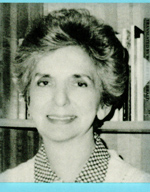By Donald H. Harrison

SAN DIEGO—A small crowd gathered in the sanctuary of Temple Emanu-El on Thursday evening, August 12, to meet the poet Gertrude Rubin of Chicago, who was introduced by her daughter and son-in-law, Bonnie and Lawrence Baron.
Rabbis Martin Lawson and Lenore Bohm helped make the introductions, with Bohm reading two of Rubin’s poems and Lawson reaching into literature to help us define the context of our meeting with the poet.

We learned that Gertrude Rubin had not started writing poetry until she was in her 50’s, en route to an MFA in poetry from the University of Illinois. We learned that many of her poems deal with social activism, reflective of the fact that she had been an important force in the 1970s in a group called Women Mobilized for Change.
There was one major problem with our introduction to this amazing woman.
She wasn’t there. She had died a month before in Chicago at the age of 89. We, a half continent away in San Diego, simultaneously were meeting her and bidding her goodbye, at a special shiva minyan arranged by the Reform temple to help comfort the Barons, both of whom are well known in the local Jewish community, along with their son Ari.
Bonnie, daughter of the poet, had worked as a social worker in adoptions for Jewish Family Service, and Lawrence, her husband, is professor of Jewish history at San Diego State University, located just a few blocks from Temple Emanu-El.
The crowd that assembled to honor a poet whom most had never met also was demonstrating its respect and affection for the Barons, whose lives of service and mitzvot exemplify some of the ideals Rubin had dramatized in her poems.
Reminiscing about her mother, Bonnie asked: “How many daughters had a mom who took her on her first peace march in Washington D.C.?” Or who published two poetry books, The Passover Poems, and A Beating of Wings.
Rubin, we learned, was a mother who washed Bonnie’s mouth out with soap for saying a swear word, who ran a Girl Scout troop for many years, who “showered her children with unconditional love and who glided with her husband (Philip, who died five years earlier) across the dance floor of life, with big band music in the background.”
Lawrence, whose friends call him “Laurie,” said that “as a historian by profession I believe that the dead leave behind an imprint on the present; their memory influences the lives they’ve touched.”
In 1973, Rubin gave an interview, from which Laurie read excerpts.
Once Rubin heard a school principal “speaking patronizingly about her Latino students.” She wrote a few lines in protest and “I was called down to the district superintendent, but for me it was a new beginning….
“Being Jewish I understood that the historic thrust toward the final solution, although sporadic, remains unsatisfied. But I came to realize that before they come to destroy me for being a Jew, I could be destroyed in many other ways.”
Rather than suffer such destruction by acquiescing to injustice, Rubin became involved with Women Mobilized for Change. The politically progressive women “lived, marched, traveled, laughed and cried together,” she recalled. In the process she met mothers on welfare, ex prisoners, and people with vastly different life experiences, and became “profoundly impressed that in this world their gifts go unrecognized….
“Years ago, some friends mentioned the Rosenberg trial to me, and felt that it was a government frame up. I thought they must be mistaken. The Rosenbergs must have been guilty of betraying state secrets. Otherwise our country wouldn’t have prosecuted them. Such was my belief in the credibility of authority. All that has shattered because time and time again, I have seen the evidence of the injustice of justice. This loss of belief was done without trauma, it was progressive…. What remains after the dust settles is not despair, not at all. There is a kind of joy, a belief in myself, of energy released for transformation…”
Some of Rubin’s political beliefs were expressed in her poetry:
Memories Of Vietnam
in the CuChi foothills. I’d get
to see the Bob Hope Christmas Show,
join the G.I. laughter, feel my
manhood swelling at the sight of
the All-American bosom, bouncing
in a patriotic frenzy, while I’d
clap my hands, and stamp both feet
(unless one was missing), and bawl
out loud to “Silent Night”, until
the last musician shut his case,
and Bob Hope’s starlets danced
into the sky like specks of flak,
and I’d go back to killing without
time to ask: what was I laughing at?
In other poems, she juxtaposed Jewish belief and present realities:
Passover For the Residents
early. For each: a small
Seder plate of matzos, apple-
sauce, parsley, roasted egg.
Horseradish and fish-balls.
All went well, but someone at
Table Six took a sip of wine
before the first blessing. Was
it Ida, who burst into tears
and begged to leave the room?
Anna was festive in black silk,
faux pearls. Her remaining leg
sported a T-strap sandal…
Later, they sang songs praising
(in unison) God’s miracles —
“Day-Day-Enu! Day-Daay-Enu!”
Clapping like children; like
Seers whose practiced hands
summon the past. After the
meal, they were wheeled down
a corridor, only to wait at
the Center’s stalled elevator.
Suddenly they were Israelites,
“come out of Egypt”. Huddled at
the edge of the Red Sea,
praying it would open.
*
It was a special occasion, meeting such a poet. My wife Nancy and I are grateful that Bonnie and Laurie as well as the two rabbis arranged such a nice introduction. May our new friend Gertrude’s memory be for a blessing.
*
Harrison is editor of San Diego Jewish World